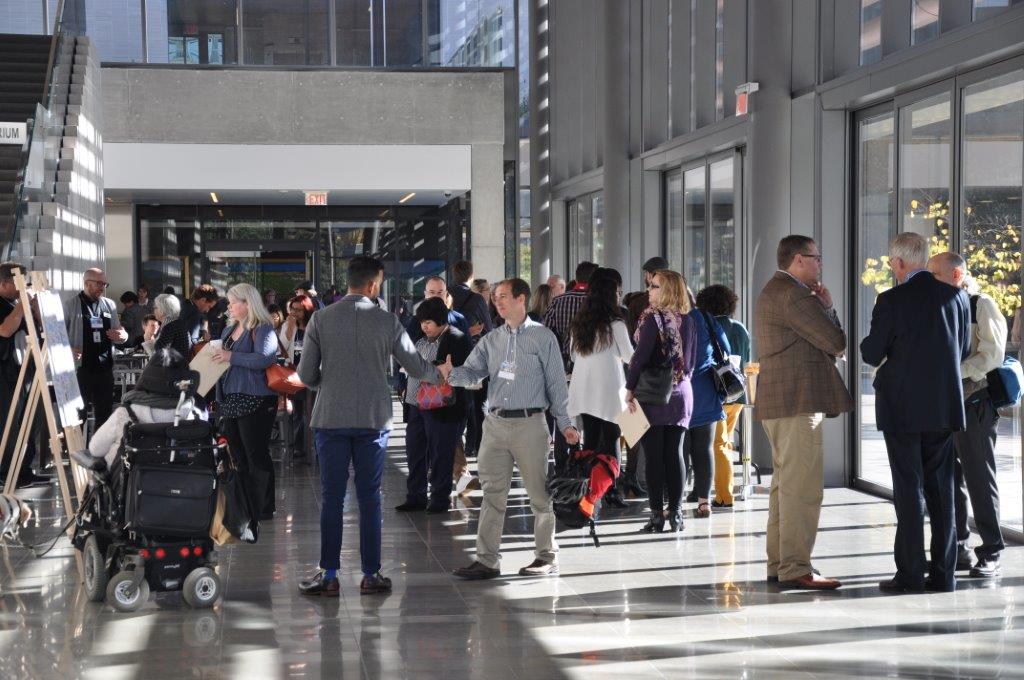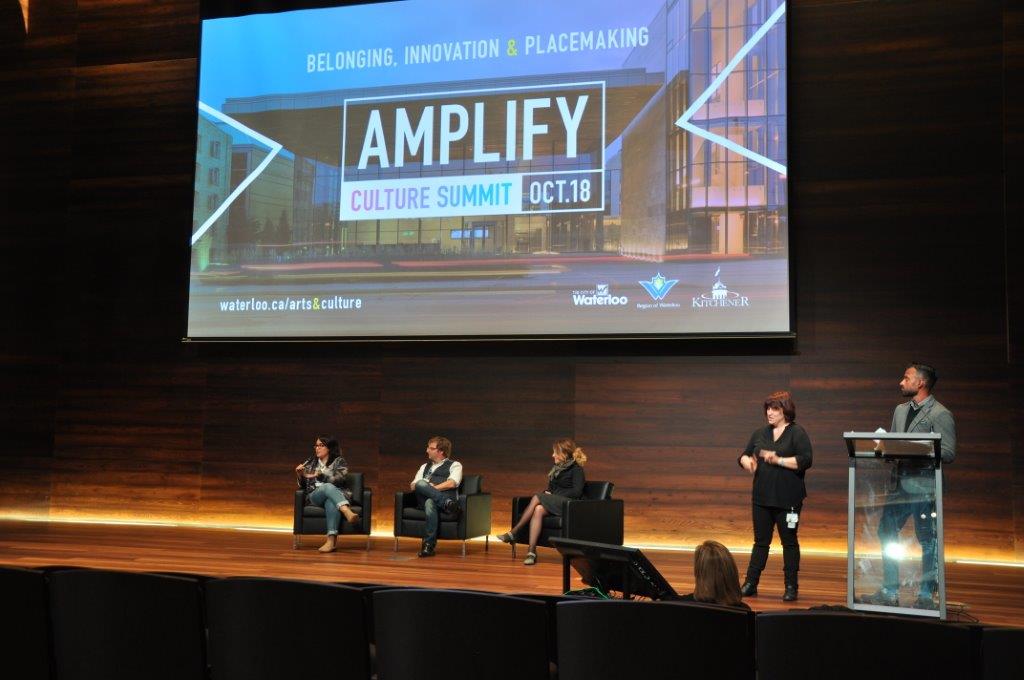By Sharon Whittle
The Amplify Summit hosted by the City of Waterloo gathers researchers, artists, designers and creative industry members to showcase cutting-edge ideas that explore the fusion between community, art, and technology. Participants discover a unique opportunity for knowledge sharing, networking, and community building.
Images courtesy of the City of Waterloo
In 2016, I eagerly accepted an invitation by my workplace to attend the first annual Amplify. I looked forward to participating in the conversation of art and technology and their shared creative voice but, as an artist, I didn’t think it was for me. After all, my art is pretty non-tech based. How could a Summit that delves into the fusion of art and technology be applicable to my art? At the first Summit, Jeremy Frieburger from CoBALT Connects spoke about the Biometrics of Belonging and his work in Hamilton with regional and municipal partnership development and creative sector development. At the risk of overstating, he blew my mind. His talk wasn’t just a sharing of his experiences. It was a call to arms: break free of expectations, utilize technology to create and share creation, and – most importantly – work collaboratively and honestly with others.
In response to a question from the audience about how the City should increase support to artists, Jeremy challenged the group present to invert this kind of thinking. Organize together, set professional standards, set community-focused goals, embrace them, and be kind to one another to show the City what we can do. While the City can and does lead, it doesn’t end there. As citizens, it’s our responsibility to be the support we want to see for the arts. We need to stop waiting for others to “fix” what we think has gone “wrong” and stop laying blame.
As a participating member of The Mary Allen Studio Tour, I have worked to support this community event since 1996. Started in 1989 by a group of dedicated artists living in Waterloo’s Mary-Allen neighbourhood, the tour is an opportunity for artists to share their work, passion and expertise with the community. There was nothing “wrong” with the Tour, but truthfully, like any group that has been together for a long time, we struggled with seeing ourselves in a new light. Times had changed, and it was time to admit this.
With Jeremy’s words still resonating, I attended a MAST meeting later that week, and as we rehashed (once again) the same topics, the same problems, and the same questions, I realized this was an opportunity to be our own leaders. I asked for the group’s patience if they would indulge me in an exercise to re-vision ourselves and I’m glad to say they were ready to see how we could support one another through change and quickly agreed to a new plan. This led to the most dramatic shift our Tour has seen in its existence. New marketing, new logo, new participants, new weekend, new times, and new partnerships resulted. The response to the new mindset has been amazing, but there is still more we can do.
This year and in a different job, I attended Amplify as a private citizen and was glad I did. Dawn Matheson, Hiba Abdallah, and Remco Volmer inspired as they discussed their works, collaborations and journeys in Belonging, Placemaking and Innovation. They challenged old approaches to art and the sharing of art and creation. Each speaker, as well as those in the breakout sessions, shared their vision and efforts on how to engage and collaborate to keep art and access real and immediate. They discussed how technology could both challenge this and at the same time make it easier. Bob Egan of Kitchener Public Library and Tara Cooper, Fine Arts professor at the University of Waterloo, talked passionately about how public and private institutions can help improve and continue community access and how partnerships help make that happen.
I have attended Amplify as an employee with a mandate, and separately as a private citizen with a purpose, and both times each session, each presenter, each participant stimulated my desire to continue this journey.
Save the date: October 24, 2018, http://www.waterloo.ca/en/living/Amplify.asp
Summary of 2017 presentations:
Presenters:
Hiba Abdallah of Broken City Lab talked about a series of projects which offer an injection of disruptive creativity into a situation, surface, place, or community.
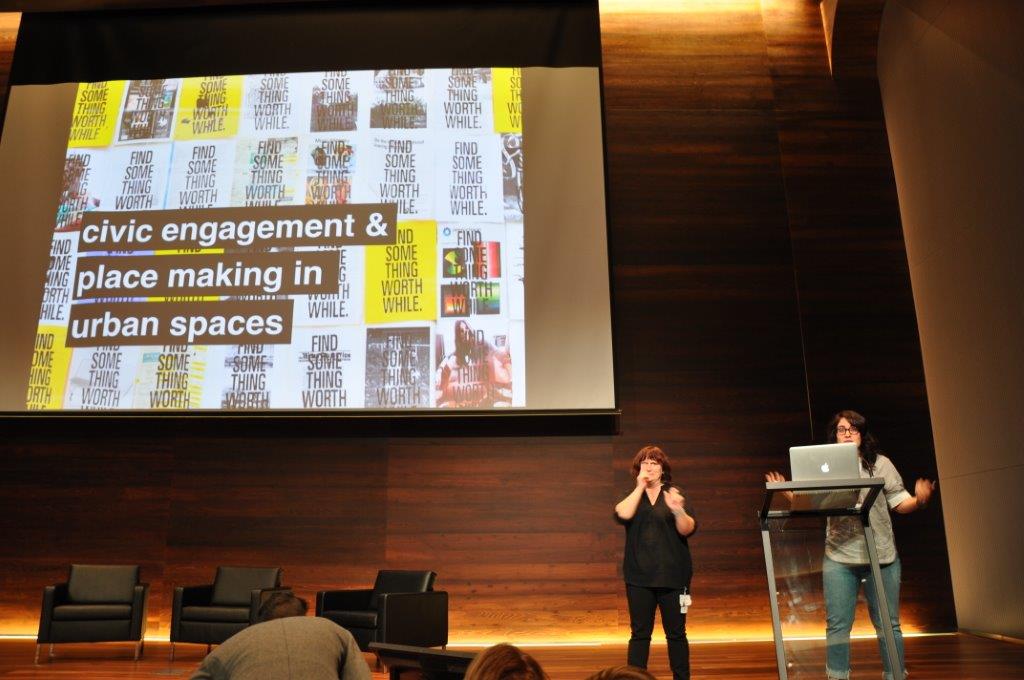
Multidisciplinary artist Dawn Matheson shared about her projects, including A Sense of Wonder, a collaboration with d/Deaf and hard of hearing youth from across southern Ontario.
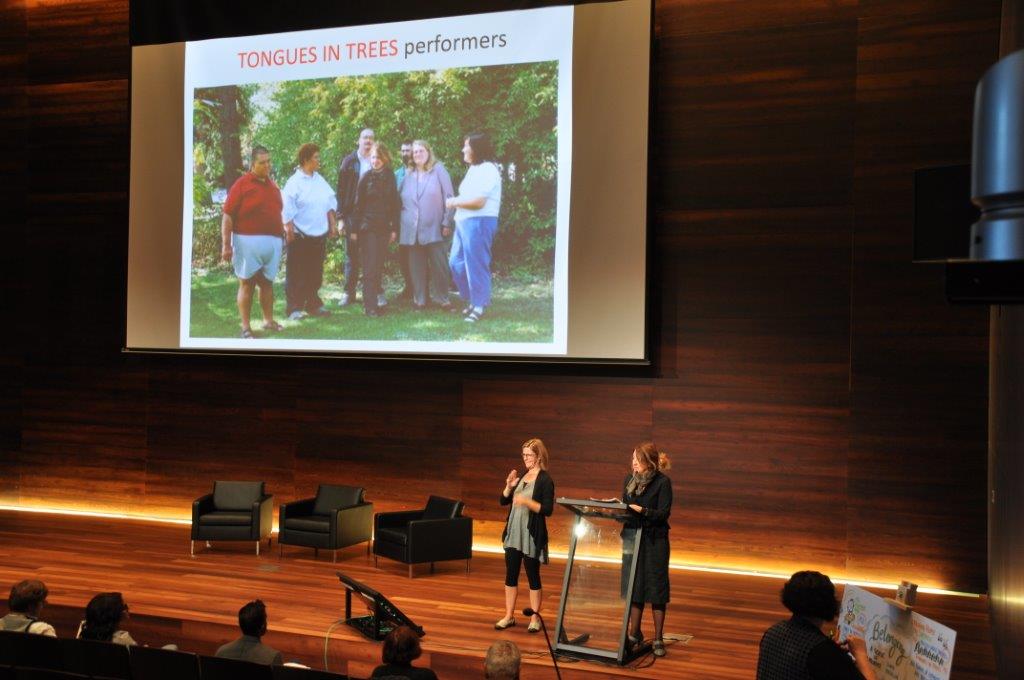
Remco Volmer of Ottawa-based collective artengine shared a range of ambitious art projects that explore the overlap between technology and humanity. 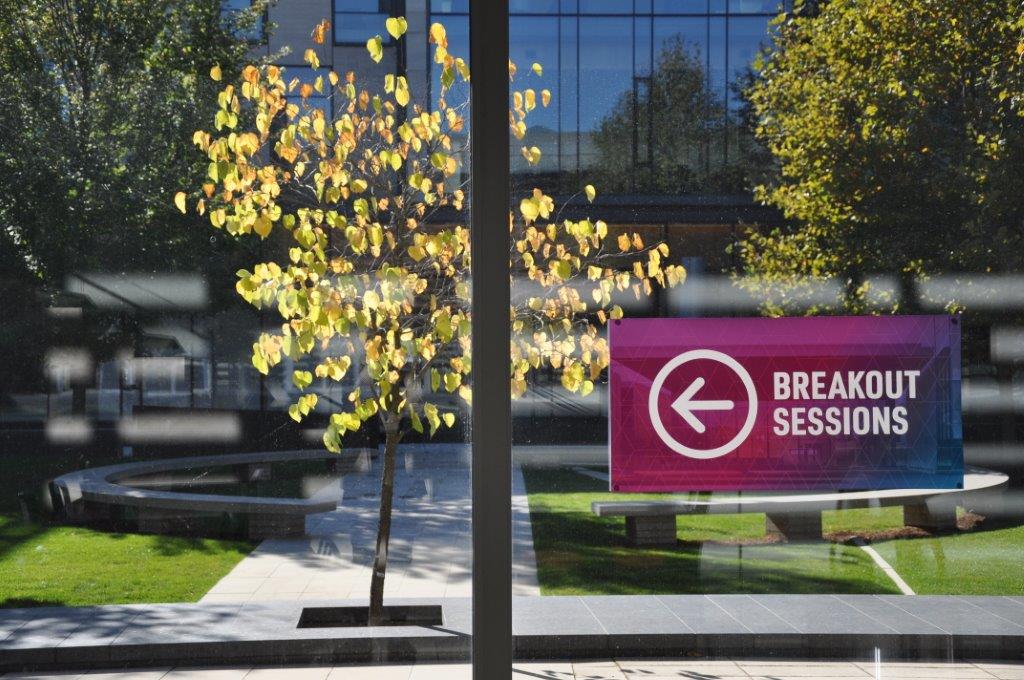
Peer-to-Peer Sessions
Paul Roorda, the artist behind Time Stops, talked about his work, including the story of Time Stops, a series of unexpected art installations that popped up around Waterloo this year.
Pamela Mulloy, Editor, Susan Scott, Lead Nonfiction Editor, and Consulting Editor Lamees Al Ethari, of The New Quarterly, hosted a round table session called Canadian Writers and Writing Call Out: Diversity in the Arts.
Bob Egan of the Kitchener Public Library ran a peer-to-peer session about the revitalization of libraries, and what can be achieved by embracing innovation and going beyond the books.
University of Waterloo professor Tara Cooper talked about S.A.I.L (Student Art Innovation Lab), a summer arts outreach program which runs out of an Airstream trailer. The trailer was on site for attendees to visit.
Shirley Madill, executive director of the Kitchener-Waterloo Art Gallery, spoke about layering the gallery experience, captivating a multifaceted audience and decolonizing space.
CAFKA in the Global Context was presented by executive director Gordon Hatt and board member Victoria Kent. They toured smaller cities similar to Waterloo, across Canada and abroad, that over time have become cultural tourism destinations known for contemporary art festivals.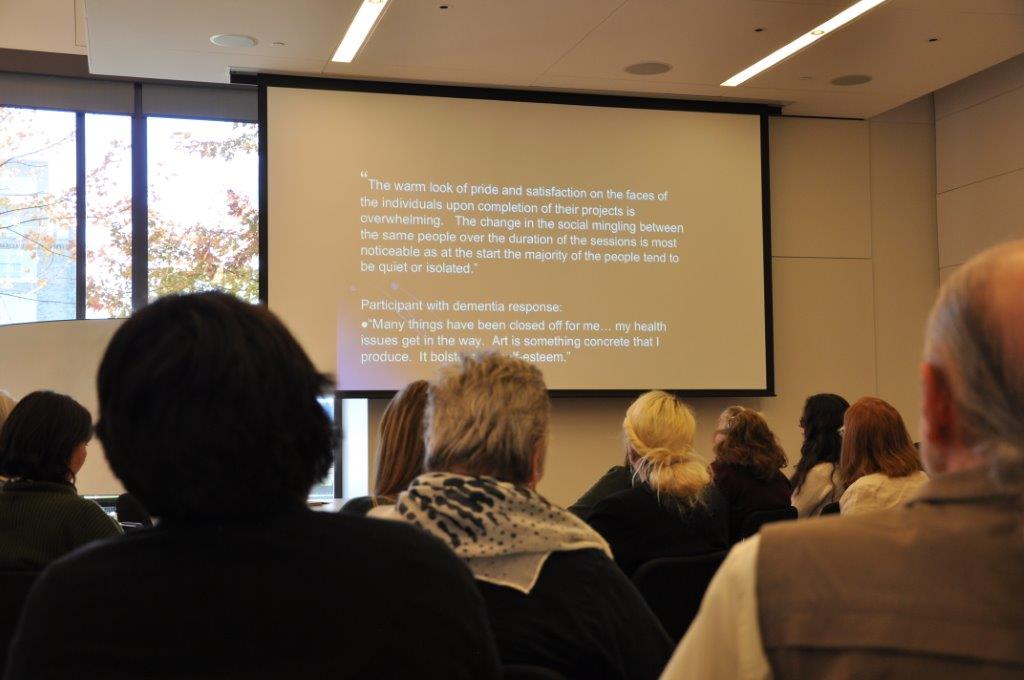
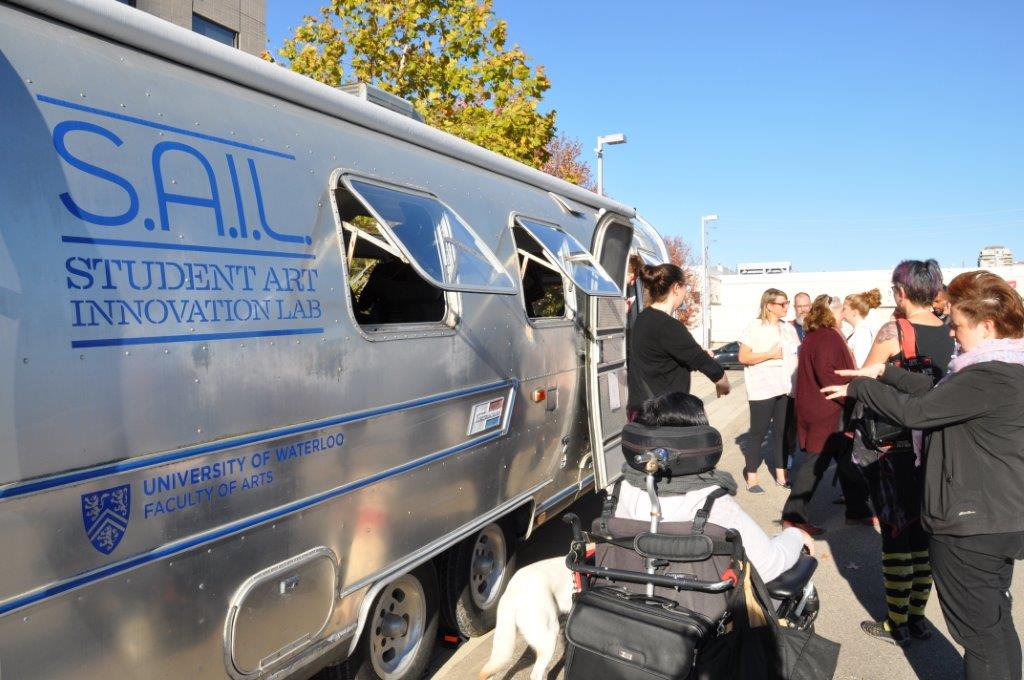
Keynote
Phillip Winn, of Project for Public Spaces, gave the keynote on placemaking – how planning, enlivening and reimagining public spaces might be approached.
